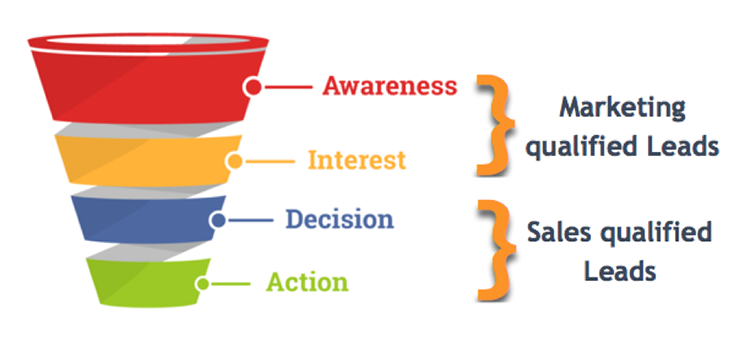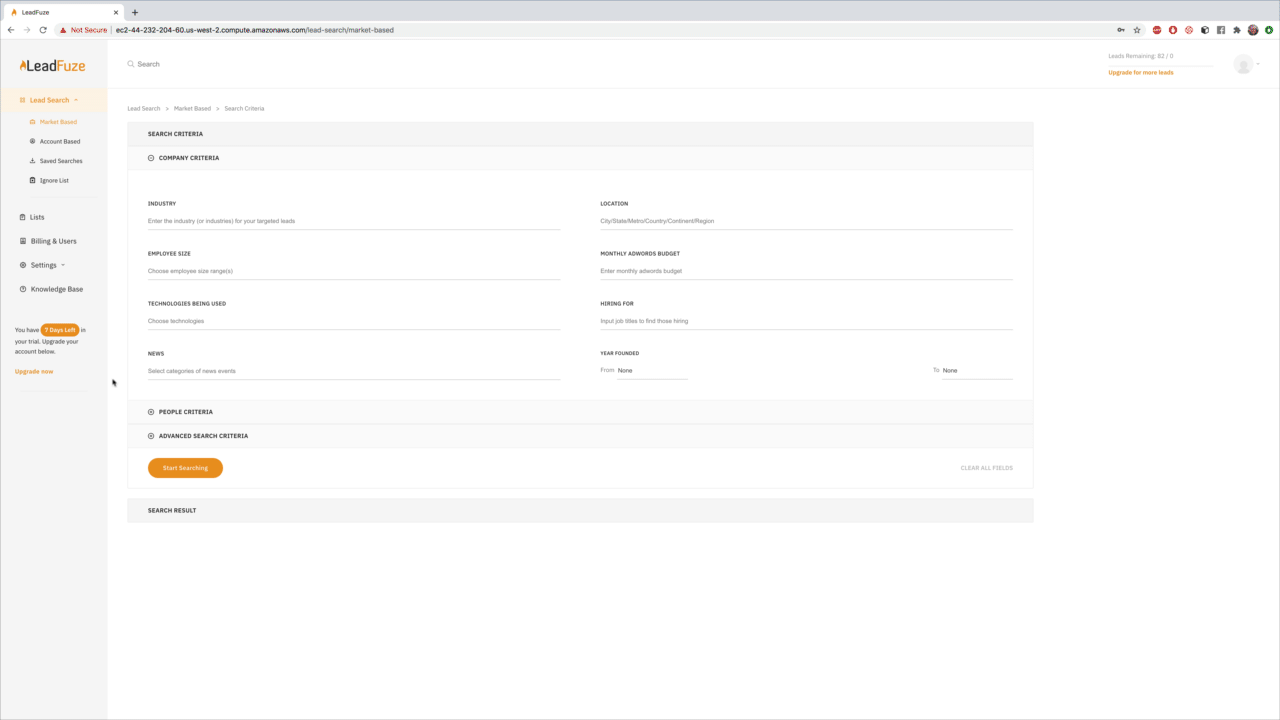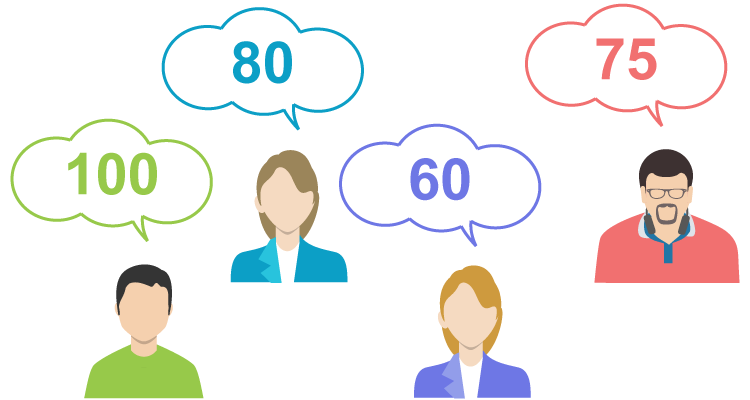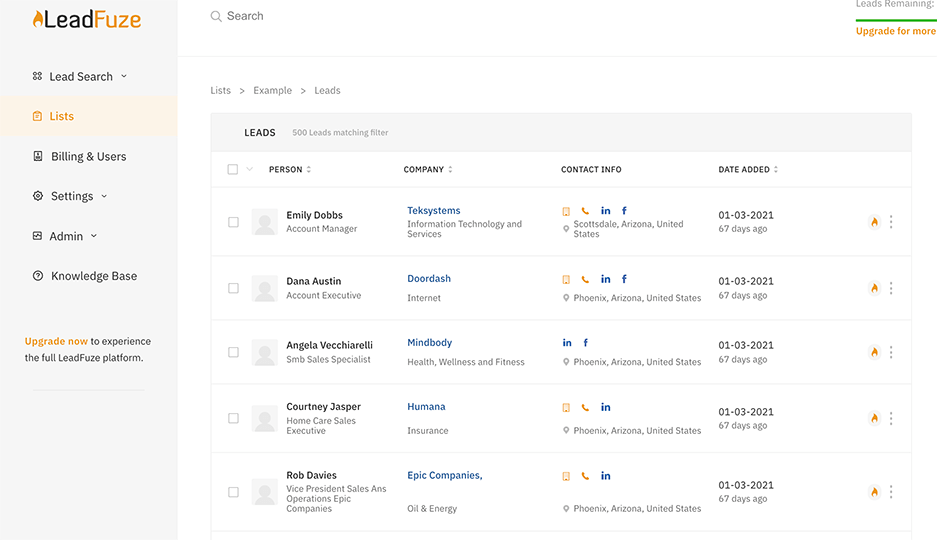What is a Marketing Qualified Lead
A marketing qualified lead is more likely to become a customer compared to other leads. These are people that have shown interest in your product or service by visiting your website.
MQLs (marketing qualified leads) can be generated via marketing channels such as search engine optimization and social media advertising campaigns, email marketing and advertisements, content marketing and more.
Marketing qualified leads can be identified by their actions and behaviors! They will have shown interest in your company or product, may have expressed intent to purchase a good or service from you and they are ready for conversion.
A marketing qualified lead is someone who has visited an online store; browsed products on your website; asked for more information about a product or service and so on.
Lead qualification is the process of gathering information to assess the lead’s marketing readiness.
Here are some ways to qualify a lead:
- they have made an inquiry about your company or sales representatives;
- they are interested in subscribing to a blog and receiving updates from you.
The purpose of the MQL stage of your sales funnel is to identify between the two types of MQLs.
Don’t worry, we’ll explain.
There are two basic types of leads in any funnel. Those who may buy (after some research and being pitched) and those who don’t intend to buy at all.
The former are called “Prospects” and the latter are labeled “Suspects”.
There are three perspectives of leads in your funnel:
- Prospect: The point of prospects entering the funnel is to research and genuinely determine the fit of your solution with their needs.
- Suspect: A suspect will enter your funnel for any number of reasons, besides any intent to buy. Maybe they want your download, or they are bored, etc.
- You: The purpose you need to focus on is differentiating between those who could be sales-ready soon and those who are wasting your time.

What is a Sales Qualified Lead
A sales qualified lead is a prospect that has been vetted and researched by your sales team. They have a high probability of becoming a customer and are qualified by your marketing or sales teams.
They are deemed to be ready to buy or at least ready for more in-depth marketing and sales conversations.
Notice the words “vetted” and “deemed ready”.
A lead has been checked out and deemed a genuine prospect; this lead has been educated and has ultimately “raised their hand”—ready for a conversation.
The MQL process can take some time, but when the sales team kicks in, things tend to speed up.
It’s this faster pace that necessitates the need for a great system of identifying when a lead hits that plateau and is ready for the sales team.
Sales qualified leads are determined by a series of steps your team follows to find out who has the highest probability of converting, as opposed to marketing qualified leads which are prospects that have shown some initial interest but need further vetting before they can be converted into paying clients.
In order to qualify sales leads, prospects need to show that they are ready to buy, which can be determined by a few different factors:
- They have been educated on what your company does and has a fair understanding of the products and services you offer
- They have been exposed to marketing materials, such as an e-newsletter or social media campaign that showcases your value proposition
- They are looking for information on pricing
- They are asking questions about how much something will cost before moving further into the sales funnel
There are a couple of basic ways for you to judge a lead that is “more likely to become a customer…”—by hand or through lead scoring.
- By Hand: This means that you’ve used your ideal buyer personas to find a list of highly targeted buyers (or purchased a list) that could be open to hearing more about your solution. Typically, this is a more “hands-on” approach and is for B2B sales reps looking for brands within a certain set of firmographic data.
- Through Marketing: You’ve either drawn them to your landing page through ads, inbound marketing, or other means. This also means that they’ve “taken the bait” and given you their email, signed up for something, or even requested interaction with you.
Keep in Mind: There may be other ways for leads in sales to come your way (e.g. referrals).
Difference Between a Marketing Qualified Lead and Sales Qualified Lead
To make it clearer, here is the difference between the two:
A marketing qualified lead is someone who has been exposed to your marketing materials, such as an e-newsletter or social media campaign that showcases your value proposition
A sales qualified lead is a prospect who needs information on pricing and asks questions about how much something will cost before moving further into the sales funnel.
The two are not mutually exclusive. For example, someone exposed to marketing may have a question about pricing and become sales qualified at that point.
The marketing qualified lead can also turn into a sales qualified lead, if the prospect is further interested in your product and poses relevant questions.
SQL vs. MQL
- A marketing qualified lead will have a larger number of qualifications, such as the aforementioned exposure to your marketing materials.
- A sales qualified lead has fewer qualifiers; they are already well aware that you may be able to solve their problem and just need some information before making any commitments.
Marketing can only be done once, but it doesn’t mean that you won’t continue to come into contact with the person who becomes a lead. This is one of the advantages of having marketing-qualified leads: they are more likely to turn into a sales-qualified lead.
You can use techniques like blogs or social media posts to stay in contact with potential customers while they are considering your product.

(Image Source: Paldesk)
Why do You Need to Identify MQLs and SQLs
It’s important to identify between MQLs and SQLs to have a successful SQL marketing campaign.
MQLs are what you want in the long-term: they can be contacted at any time and will eventually turn into SQLs when they’re ready for your product or service.
SQLs, on the other hand, need to be immediately addressed since their needs are immediate; if you don’t react fast enough, they will lose interest and never come back.
A successful marketing campaign will have a steady flow of MQLs that turn into SQLs when the timing is right for them to become customers.
Your marketing plan needs to take this into account by focusing on bringing in more leads at every stage of their customer journey with your company.
When you don’t know the difference between the two, you might end up focusing too much on marketing qualified leads, which are just potential customers.
Your marketing plan doesn’t need to focus as heavily on bringing in marketing qualified leads.
When you focus more on SQL sales leads, your marketing plan will have a better chance of converting them into customers because they know why they need what you’re offering.
When is a Marketing Qualified Lead Ready for Sales?
The bridge between marketing and sales is critical.
With that said, here are some pointers and resources to help you identify that key moment when a Marketing Qualified Lead should transition to sales-readiness.
Filling the bucket
Hopefully, you’re working with a good CRM.
Any software worth its weight in code will include some sort of lead scoring capability. The purpose of putting a number on each lead is to figure out their perceived value and once it hits a certain level (based on research and past data)—they’re shipped off to sales.
It’s a little like those giant buckets of water at a theme park.
It slowly fills until it reaches a certain point when the weight of the bucket starts its unstoppable process. Everyone can see what’s about to happen as it sends the water pouring out over all the anxious kids beneath.
If your system is followed and implemented correctly, the lead will begin to shift their weight toward purchases and it will be noticeable to everyone looking at the data.
While our illustration is simple, this can get complicated.
As we mentioned, the buying crowd is getting antsier and funnels are becoming more and more complex.
Instead of sending a two to three email sequence and then moving in for the close, it takes a more sophisticated method of identifying where your leads are in your nurture campaign.
Selling too soon or too late makes all the difference in your conversion rate.
In a great post by ConversionXL, they debunk the thought that “sales funnels are linear”.
The real funnel looks more like a tornado where leads spin around and slowly work their way to the bottom through content and interaction.
It’s worth a couple of read-throughs and could seriously help your marketing process.

(Image Source: Square 2 Marketing)
If you’re struggling to generate marketing qualified leads, you can use LeadFuze. It’s a marketing automation platform that helps companies generate more qualified leads. It makes it easy for businesses to get in front of the right people at the right time with personalized messages, automated follow-ups, and targeted campaigns.
You can use this tool’s powerful lead generation tools to find your perfect customer profile, create custom landing pages, and send out personalized emails that will convert better than ever before. With its help, you’ll be able to reach new customers without breaking a sweat!
Furthermore, it can help you get more sales with its powerful and easy-to-use tools. Its team of experts will help you find the perfect solution for your business, so you can grow without any hassle.
You don’t have to worry about generating leads on your own anymore! LeadFuze will take care of everything for you – from finding customers who are interested in what you offer, to getting them on the phone or into your store.

Get started today by signing up for a free trial on LeadFuze!
The missing link in most companies
While marketing can see the shift of the lead towards becoming sales qualified, there is still a definitive point at which the lead needs to be “deemed ready” (per our definition).
Many companies just blindly send the lead once it hits the prerequisite in the CRM. That’s likely a mistake.
Over time, complaints from the sales team could cause a divide between your marketing department. Sending poor leads based on things that sales understand, but your marketers may not.
In your sales pipeline, the point between MQL and SQL is where the most money leaks out.
The solution is an interdepartmental step where a sales rep gets a chance to directly interact with the lead (preferably via phone call).
Marketing should be heavily involved as the conversation will include tons of insightful data that can be used to:
- Better score future leads
- Weed out hidden suspects not willing to buy
- Create better content that better readies leads for the sales team
This step actually has an entirely new label of “Sales Accepted Lead” (SAL).
It’s a recognition that a lead has hit the lead scoring level deemed necessary, and interaction should be scheduled.
Now, the question is: what should be addressed in the call.
First, it’s not a sales call. It’s a call to determine one of three things:
- The lead is ready for a demo/sales call or,
- The lead needs further nurturing in the funnel or,
- The lead is a suspect.
To figure this out, you’ll need to ask a series of questions and follow-ups.
The biggest key is to listen, not just for their direct answers – but the tone, too.
How to Successfully Transition From MQL to SQL
After the lead is “deemed ready” by both the marketing folks and the sales team, they are officially transferred to SQL.
The coolest thing is that a sales call may have already been scheduled, and the lead is more excited to talk about the product than ever before.
Your rep won’t get burnt out talking to duds all day and the entire team will be excited as your conversion rate creeps higher over time.
Take the time to label your leads and set up a proper lead scoring system (using your CRM). Also, don’t be afraid to collaborate before tossing contacts back and forth between departments to dramatically improve your closed-won rate.
Here’s how you can move your leads from MQL to SQL:
Lead score
The marketing qualified lead score is a five-point scale, with one being the least likely to buy and five being most likely.
You can score them according to leads’ qualifications, how engaged they are with your marketing initiatives, and their time on site.

(Image Source: Agile CRM)
Lead behavior
Their behavior can help the marketing and sales team to determine if they’re ready to move on to the sales process.
To do this, you should first determine what an ideal lead looks like and give points to certain actions performed.
For instance, if they’ve submitted their contact details, it’s worth a point.
If they add your product to the shopping cart and enter their credit card information, that would be worth two points.
Finally, when someone makes an order on your site or starts a free trial of your service, you can give them five points!
Likelihood to buy
You can also measure a lead’s likelihood to buy by asking them which items they’re interested in.
If you ask marketing qualified leads if they are interested in any of your products, their answer is usually yes; the fact that they’ve signed up for an email list or online newsletter makes it more likely than not that one day they’ll purchase something you offer.
However, if you ask sales qualified leads the same question, and they say yes, it’s much more likely that their answer is truthful because marketing materials or other efforts have persuaded them to give your products a try.
In either case, the number of items they’re interested in increases their likelihood to buy something from your company when the time is right.
Why are Marketing Qualified Leads Important
Let’s face it: sales qualified leads are important because they are more likely to purchase something from your company in the future than marketing qualified leads.
The latter will usually buy one or two of your products and then stop buying because they were just interested in a trial, but sales qualified leads have already given you their email address, so it’s very easy for them to continue purchasing things on an ongoing basis.
However, your marketing team should focus on getting marketing qualified leads because it can lead to more sales qualified leads, but not the other way around. Marketing teams are often tasked with converting these prospects into customers and convincing them that your company is a better fit than their current provider or competitor.
Conclusion
Overall, a marketing qualified lead and a sales lead are two different things. And hopefully, this blog post has successfully explained the difference between the two.
To give a quick recap, a marketing qualified lead is someone who has shown interest in your company and expressed an intent to buy, while a sales qualified lead is when they have given you their email address.
An important thing for businesses to keep in mind is that marketing qualified leads generally do not purchase anything from your company because they are not yet convinced enough to buy anything. They are still on the fence about it and need more convincing as they have shown interest in purchasing a product rather than simply giving their email address.
A sales qualified lead, however, does show an intent to buy by providing you with their email address. They are more likely to purchase something if you send them an offer with a discounted price or other promotions that could entice them into buying, and they are already convinced about the company behind the product.
Want to help contribute to future articles? Have data-backed and tactical advice to share? I’d love to hear from you!
We have over 60,000 monthly readers that would love to see it! Contact us and let's discuss your ideas!


